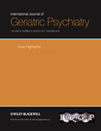Risk factors for postoperative cognitive and functional difficulties in abdominal aortic aneurysm patients: a three month follow-up
Abstract
Background
Cognitive impairment and deficits in functional performance are major concerns following surgery, particularly for older patients. The objective of this study was to examine predictors of postoperative cognitive and functional difficulties and explore the relationship between presurgery and postsurgery cognitive ability and functional performance.
Methods
89 patients undergoing elective abdominal aortic aneurysm (AAA) surgery were administered a battery of cognitive measures preoperatively, at the time of discharge from hospital and 3 months postoperatively. Functional performance was evaluated by the Portland Adaptability Inventory (PAI), both pre and postsurgery. Symptoms of delirium were assessed during the first six postoperative days.
Results
A diagnosis of delirium had a mild effect on functional performance 3 months postoperatively. The strongest predictors of postoperative functional performance were the level of functioning presurgery, a longer length of hospital stay and the total number of days delirious. Cognitive impairment postsurgery was predicted by presurgery cognitive measures of verbal memory and psychomotor speed performance and the total number of days delirious.
Conclusions
Functional performance outcomes for AAA patients 3 months postsurgery revealed no significant loss of functioning relative to presurgery levels, although longer length of hospital stay and greater number of days delirious was associated with somewhat poorer outcome on indicators of social and physical functioning. Cognitive impairment postoperatively was fairly mild but when it was found it was associated with number of days delirious and preoperative deficits in verbal memory and psychomotor speed. Copyright © 2010 John Wiley & Sons, Ltd.




